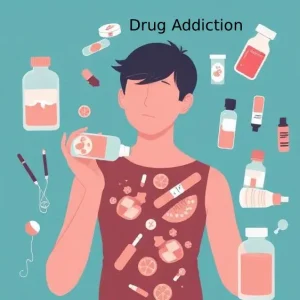Overview
Diagnosis
Diagnosing drug addiction (substance use disorder) involves a detailed evaluation and usually includes assessment by a psychiatrist, psychologist, or licensed drug counselor.
-
Lab Tests: Blood, urine, or other laboratory tests may be done to detect recent drug use, but these are not diagnostic for addiction. They are mainly used for treatment monitoring and recovery tracking.
-
DSM-5 Criteria: Diagnosis is typically based on criteria from the Diagnostic and Statistical Manual of Mental Disorders (DSM-5) published by the American Psychiatric Association.
Treatment
While there’s no cure for drug addiction, effective treatments can help individuals overcome dependence and live drug-free. The type of treatment depends on the specific drug used and any co-existing mental or medical conditions. Long-term follow-up is crucial to prevent relapse.
Treatment Programs
Most substance use disorder programs offer:
-
Individual, group, or family therapy
-
Education on addiction and relapse prevention strategies
-
Different levels of care, such as outpatient, inpatient, or residential programs
Withdrawal Therapy (Detox)
The goal of detoxification is to stop drug use safely and quickly.
-
Some individuals may undergo outpatient detox, while others require hospitalization.
-
Approach varies by drug type — depressants, stimulants, or opioids require different detox methods.
-
Medications such as methadone, buprenorphine, or buprenorphine-naloxone may be used for opioid withdrawal.
Opioid Overdose
-
In case of an opioid overdose, naloxone (in nasal spray or injectable form) can reverse life-threatening effects temporarily.
-
Available under brands like Narcan or Kloxxado.
-
Immediate medical attention is necessary after using naloxone.
Medication-Assisted Treatment (MAT)
Medications don’t cure addiction but can reduce cravings and prevent relapse. Common medicines include:
-
Buprenorphine
-
Methadone
-
Naltrexone
-
Buprenorphine-naloxone combination
Behavior Therapy
Behavioral therapies help modify attitudes and behaviors related to drug use. They may include:
-
Coping strategies for cravings
-
Relapse prevention planning
-
Addressing employment, legal, or relationship issues
-
Family counseling for communication and support
-
Dual diagnosis treatment for co-occurring mental disorders
Self-Help Groups
Support groups such as Narcotics Anonymous (NA) or other 12-step programs promote recovery and community support.
-
Help reduce shame and isolation.
-
Encourage long-term accountability and connection.
-
Can be found locally or online with the help of a counselor.
Ongoing Treatment
Recovery requires continuous care and monitoring to prevent relapse.
-
Includes follow-up counseling, group therapy, and self-help meetings.
-
Immediate intervention is advised if relapse occurs.
Advertisement

